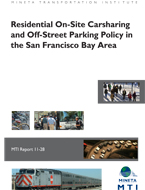- 408-924-7560
- mineta-institute@sjsu.edu
- Donate
Residential On-Site Carsharing and Off-Street Parking Policy in the San Francisco Bay Area
In light of rising motorization, transportation planners have increasingly supported alternatives to the indiscriminate use of the car. Off-street parking policy and carsharing have emerged as credible alternatives for discouraging car ownership. This report explores an initiative that could connect these policy fields and build on their synergy: the provision of on-site carsharing service in residential developments. It evaluates the performance of on-site carsharing programs in the San Francisco Bay Area by interviewing developers, planners, and carsharing service providers.
Interviews were conducted in four Bay Area cities that support the provision of carsharing as an alternative to the private automobile. Based on these interviews, this report identifies the principal factors contributing to the success or failure of on-site carsharing: the unbundling status of off-street parking in residential developments; ties to off-street parking standards; financial constraints; and the level of coordination among stakeholders. The interviews revealed that on-site carsharing has been accepted by developers, planners, and service providers, particularly in densely-populated, transit-rich communities. Nevertheless, there appears to be a gap between on-site carsharing programs and off-street parking standards, and between carsharing programs and carsharing business operations.
The authors recommend that a few models for establishing carsharing policy be tested: a model designed to serve high-density cities with traditional carsharing; and another designed to serve moderately-dense communities, with new carsharing options (e.g., peer-to-peer). In the case of the latter, trip reduction can be achieved through the promotion of alternative modes along major corridors.
CHARLES RIVASPLATA, PhD
Charles Rivasplata is a lecturer in the Urban and Regional Planning Department at San José State University, where he has taught local and regional transport planning classes since 2007. He is a senior transport planner at the San Francisco Municipal Transportation Agency (SFMTA), largely focusing on transportation policy analysis. He earned master’s degrees in Civil Engineering and City and Regional Planning from the University of California (UC) at Berkeley (1991), and a PhD in Transportation Policy from UC Davis (2006). His doctoral dissertation focused on the impacts of Labour Party reforms on transit integration in the U.K. His research has centered on a number of topics, including transit privatization and deregulation, minibus competition (in South Africa), regional governance, and travel demand management (TDM). In addition, Dr. Rivasplata has offered courses at UC Berkeley and the Central University of Venezuela, as well as seminars at Cambridge University, UC Davis, the University of Cape Town, and the Polytechnic University of Catalunya.
ZHAN GUO, PhD
Zhan Guo is an assistant professor of urban planning and transportation policy at the Wagner School of Public Service, New York University. He studies transportation and land use, public transit, and pedestrian behavior. He is interested in understanding the multiple travel options faced by individual travelers and how government policies could affect the availability of these options and the subsequent individual decisions. His research has focused on two interesting and interconnected questions. First, how does governmental regulation over the built environment (e.g., land use planning and infrastructure investment) limit travel options and encourage one particular travel means (car driving)? Second, how do travelers perceive different travel options? Could we reinforce, change, or even deceive that perception in order to promote the “right” behavior? Within this framework, Dr. Guo has conducted empirical studies on residential parking policy, pedestrian environments, mileage-based fees, transfer behavior, and transit maps in Boston, Chicago, London, Portland, and New York City.
RICHARD W. LEE, PhD., AICP
Richard Lee is a lecturer in the Urban and Regional Planning Department at San José State University and has been a research associate with the Mineta Transportation Institute (MTI) for over 15 years. He has led MTI studies of general plans and sustainability, airport planning, and sustainability indicators for transportation. Dr. Lee is also an associate with Fehr & Peers, and he has over 25 years of experience as a transportation consultant and academic. His consulting experience includes management of regional transportation plans, general plan studies, high-speed rail and transit projects, as well as a wide variety of traffic impact, travel demand management, and transportation policy studies. The majority of his recent work focuses on quantitative analysis of the transportation effects of New Urbanism, including its efficacy in promoting transit and alternative modes. Dr. Lee earned his master’s degrees in Civil Engineering (1984) and City and Regional Planning (1985) and his PhD in City and Regional Planning (1995), all from the University of California at Berkeley. In 2009–2010 he was the Visiting Practitioner and Researcher at UC Davis’s Sustainable Transportation Center. He has taught transportation planning and conducted transportation research projects at several universities, including Massey University in New Zealand, UCLA, Cal Poly San Luis Obispo, UC Berkeley, and San José State University.
DAVID KEYON
David Keyon is a Masters of Urban and Regional Planning student at San José State University, concentrating in land use and transportation. He worked over seven years as a development review planner in California prior to returning to school in 2010. David has an interest in public transportation planning, which intensified after he had the opportunity to travel around the world in 2007–2008, when he observed best practices that have inspired him in his studies.
LUIS SCHLOETER
Luis Schloeter is a second-year Urban Planning student at the Wagner Graduate School of Public Service at New York University, where he specializes in international development planning. He holds a bachelor’s degree in Political Science from Universidad Rafael Urdaneta, Venezuela, where he graduated with honors. Luis has an interest in affordable housing and sustainable urban development in Latin America.
-
Contact Us
San José State University One Washington Square, San Jose, CA 95192 Phone: 408-924-7560 Email: mineta-institute@sjsu.edu






